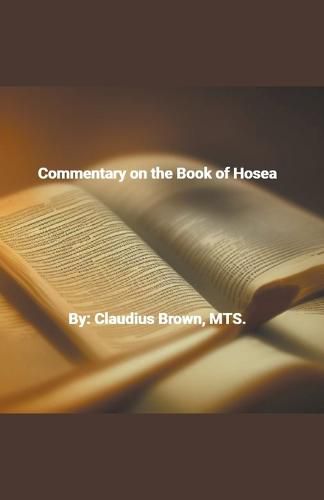Readings Newsletter
Become a Readings Member to make your shopping experience even easier.
Sign in or sign up for free!
You’re not far away from qualifying for FREE standard shipping within Australia
You’ve qualified for FREE standard shipping within Australia
The cart is loading…






This title is printed to order. This book may have been self-published. If so, we cannot guarantee the quality of the content. In the main most books will have gone through the editing process however some may not. We therefore suggest that you be aware of this before ordering this book. If in doubt check either the author or publisher’s details as we are unable to accept any returns unless they are faulty. Please contact us if you have any questions.
The Book of Hosea is one of the prophetic books in the Old Testament of the Bible. It is attributed to the prophet Hosea, who lived in the eighth century BCE. The book primarily deals with themes of spiritual infidelity, divine judgment, and the redemptive love of God. Hosea uses his own personal experiences as a metaphor to convey God's relationship with the people of Israel. He is commanded by God to marry a woman named Gomer, who represents the unfaithfulness of the Israelites towards God. Gomer's unfaithfulness and promiscuity symbolize Israel's idolatry and turning away from God to worship other gods. Throughout the book, Hosea proclaims God's judgment upon Israel for their unfaithfulness. He warns of the consequences of their actions and the impending destruction that will befall them. However, the book also reveals God's enduring love and mercy. Despite Israel's betrayal, God promises to restore them and renew the covenant relationship with them. The book of Hosea emphasizes the need for repentance, calling on the people of Israel to turn back to God and seek His forgiveness. It highlights the consequences of sin and the ultimate restoration that comes through God's grace and love. In summary, the book of Hosea deals with the themes of spiritual infidelity, divine judgment, and the redemptive love of God. It uses the prophet's personal experiences and marriage metaphorically to convey God's relationship with the unfaithful Israelites and the hope of restoration.
$9.00 standard shipping within Australia
FREE standard shipping within Australia for orders over $100.00
Express & International shipping calculated at checkout
This title is printed to order. This book may have been self-published. If so, we cannot guarantee the quality of the content. In the main most books will have gone through the editing process however some may not. We therefore suggest that you be aware of this before ordering this book. If in doubt check either the author or publisher’s details as we are unable to accept any returns unless they are faulty. Please contact us if you have any questions.
The Book of Hosea is one of the prophetic books in the Old Testament of the Bible. It is attributed to the prophet Hosea, who lived in the eighth century BCE. The book primarily deals with themes of spiritual infidelity, divine judgment, and the redemptive love of God. Hosea uses his own personal experiences as a metaphor to convey God's relationship with the people of Israel. He is commanded by God to marry a woman named Gomer, who represents the unfaithfulness of the Israelites towards God. Gomer's unfaithfulness and promiscuity symbolize Israel's idolatry and turning away from God to worship other gods. Throughout the book, Hosea proclaims God's judgment upon Israel for their unfaithfulness. He warns of the consequences of their actions and the impending destruction that will befall them. However, the book also reveals God's enduring love and mercy. Despite Israel's betrayal, God promises to restore them and renew the covenant relationship with them. The book of Hosea emphasizes the need for repentance, calling on the people of Israel to turn back to God and seek His forgiveness. It highlights the consequences of sin and the ultimate restoration that comes through God's grace and love. In summary, the book of Hosea deals with the themes of spiritual infidelity, divine judgment, and the redemptive love of God. It uses the prophet's personal experiences and marriage metaphorically to convey God's relationship with the unfaithful Israelites and the hope of restoration.